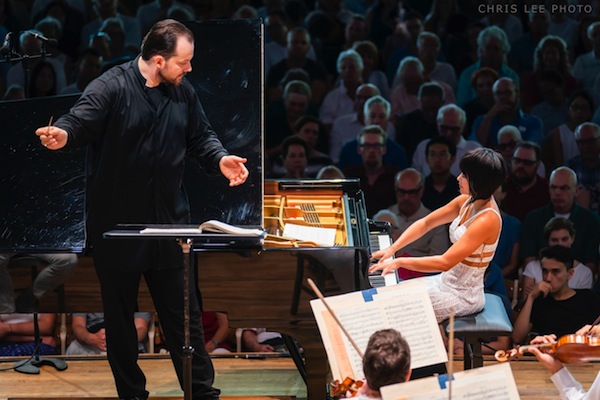Bernstein fares best in a mixed program from Nelsons, BSO

Yuja Wang performed Beethoven’s Piano Concerto No. 1 with Andris Nelsons and the Boston Symphony Orchestra Sunday at Tanglewood. Photo: Chris Lee
On July 15, 1965, Leonard Bernstein led the New York Philharmonic and Camerata Singers in the premiere of his Chichester Psalms. The work, written for England’s Chichester Festival, pleads for peace during a time when political divisions threatened to tear the United States in two in the wake of the assassination of John F. Kennedy and the Civil Rights Movement.
Sunday afternoon at Tanglewood’s Koussevitzky Shed, exactly fifty-three years since its first performance, Andris Nelsons, the Tanglewood Festival Chorus, and the Boston Symphony Orchestra offered a soulful rendition of Bernstein’s score that spoke with fresh conviction in light of today’s divisive political climate.
Scored for chorus, boy soprano, and orchestra, Chichester Psalms stands as one of Bernstein’s more overtly religious expressions. But unlike his problematic Symphony No. 3, Kaddish, which was completed only two years earlier, Chichester Psalms offers affirmation and solace in the face of unpleasant things.
Bernstein arranged the texts himself, and the quotations of various Psalms, heard in the original Hebrew, contemplate peace and tranquility. The music is cast in Bernstein’s idiosyncratic style. There are passages of soaring melody, biting dissonances that look ahead to his MASS, and jazzy passages that could have come from his popular musicals. (In fact, the choral canon in Part 2 was originally intended for the Prologue of West Side Story.)
Singing Chichester Psalms well is yeoman’s work, and the Tanglewood Festival Chorus, prepared by James Burton, was up to the task, singing the grinding dissonances of the opening with strength and precision. Elsewhere, the singers found an apt melting lyricism. The men of the choir sang the “Adonai, Adonai” of Psalm 131 with buttery tone, and the concluding verse from Psalm 133 floated in the air like quiet prayer.
A few tentative attacks apart, the eight soloists, drawn from the TFC ranks, sang their brief solo sections with zeal. But the star of the afternoon was Rafi Bellamy Plaice, a boy soprano with a pristine voice. Singing with both innocence and radiance, Plaice lofted a warm-hearted “Adonai ro-i, lo ehsar.” Nelsons’ sensitive accompaniment wrapping the singer in a velvety blanket of sound.
The popular draw to Sunday’s concert was Beethoven’s Piano Concerto No. 1, which spotlighted pianist Yuja Wang.
The Chinese pianist commands a spellbinding technique and a refinement well fit for some of the most barnstorming romantic concertos and sonatas. Yet at times her performances can result in more flash than substance, as was the case in her Celebrity Series recital this past May at Jordan Hall.
But Saturday, her playing had the soft colors of a J. M. W. Turner painting. The sumptuous Largo of Beethoven’s concerto flowed glacially and with generous rubato, and her quiet right-hand chords sounded like distant bells against the strings. Wang also drew attention to parts of this concerto that frequently go unnoticed, such as the weighty left-hand theme in the finale, which came off with thunderous force.
In the first movement, her treatment of Beethoven’s trickling phrases was firm and muscular, each note resounding with a ping. Her cadenza took on wild diversions of a Gottschalk piano fantasy. But elsewhere in the movement proper there was a mismatch between soloist and conductor. Wang’s multi-shaded lines stood in stark contrast to Nelsons’ accompaniment, which, though plush, was too often two-dimensional.
Nelsons’ technicolor interpretations are well suited to the thick scoring and earth-shaking intensity of certain romantic works. But Mendelssohn’s Symphony No. 4, which opened Sunday’s concert, is not among them.
Subtitled “Italian,” the symphony is Mendelssohn’s most ebullient creation. His textures have a Mozartean transparency, and the lines glisten when played deftly.
Unfortunately, that wasn’t the case Sunday afternoon. Though Nelsons opted for quick tempos and a lean reading by avoiding the repeat of the first movement’s exposition, the symphony lacked the bite and precision that make Mendelssohn’s style so unique. The finale’s Saltarello could have used more fire. In other spots, Nelsons quizzically drew out sections of the score, like the spinning accompaniment of that movement, that don’t always need to be brought into the foreground.
In the second movement, however, Nelsons’ fine eye to detail paid dividends. The chant-like theme heard in the woodwinds delivered moments of haunting mystery. The Scherzo was sweeping but gentle, and the horn and bassoon playing put fine touches on this mixed performance.
The next event of the Tanglewood Festival will feature Herbert Blomstedt and Tanglewood Music Center Conducting Fellows leading the TMC Orchestra in music of Mozart, Beethoven, and Brahms 8 p.m. Monday at Ozawa Hall. bso.org; 888-266-1200
Posted in Performances
Posted Dec 30, 2018 at 6:44 pm by Gary Engler
I have re-read this review just before the New Year, as my memory recalls this as a concert highlight of the year – and I was pleased to see that my memory served me well (at least in this case!) I also wanted to r-acquaint myself with the name of the boy soprano in the Chichester Psalms. I have just re-listened to Bernstein’s late recording with the Israeli Philharmonic and was struck by the young lad’s tremulous nerves. I remember Bellamy Plaice’s rock-solid intonation well – truly the voice of a pure, innocent soul. Following the intermission, seeing and hearing Lang perform with unusual restraint (as well as her usual technical aplomb) was mere icing on the cake. Truly a concert for the ages! Kudus to Nelsons and the BSO!